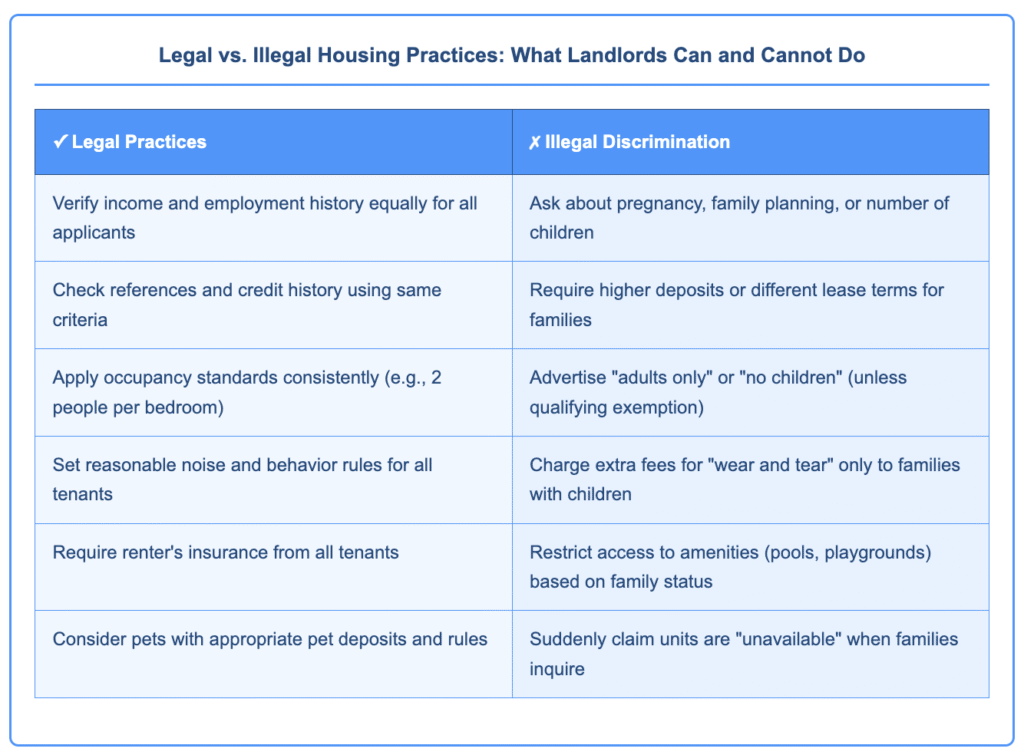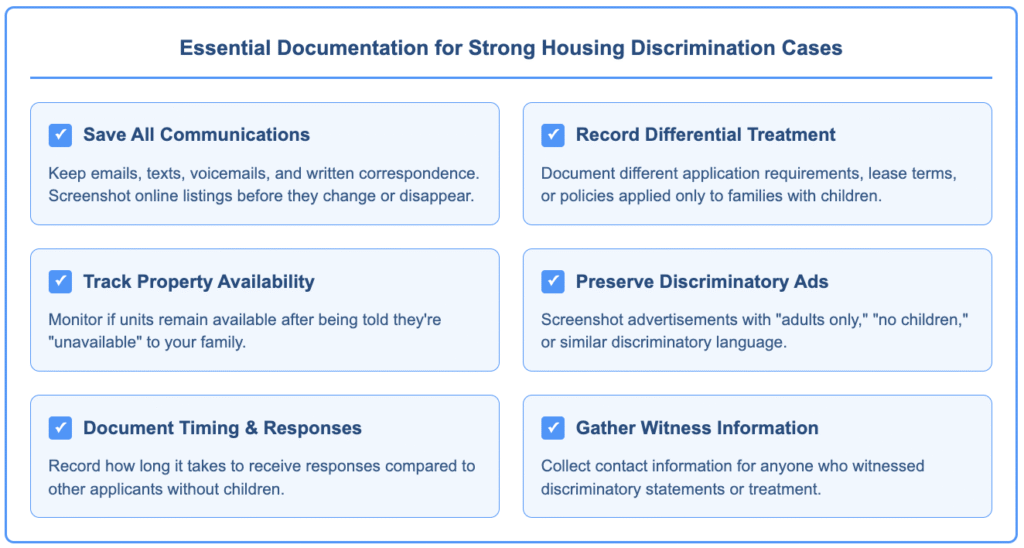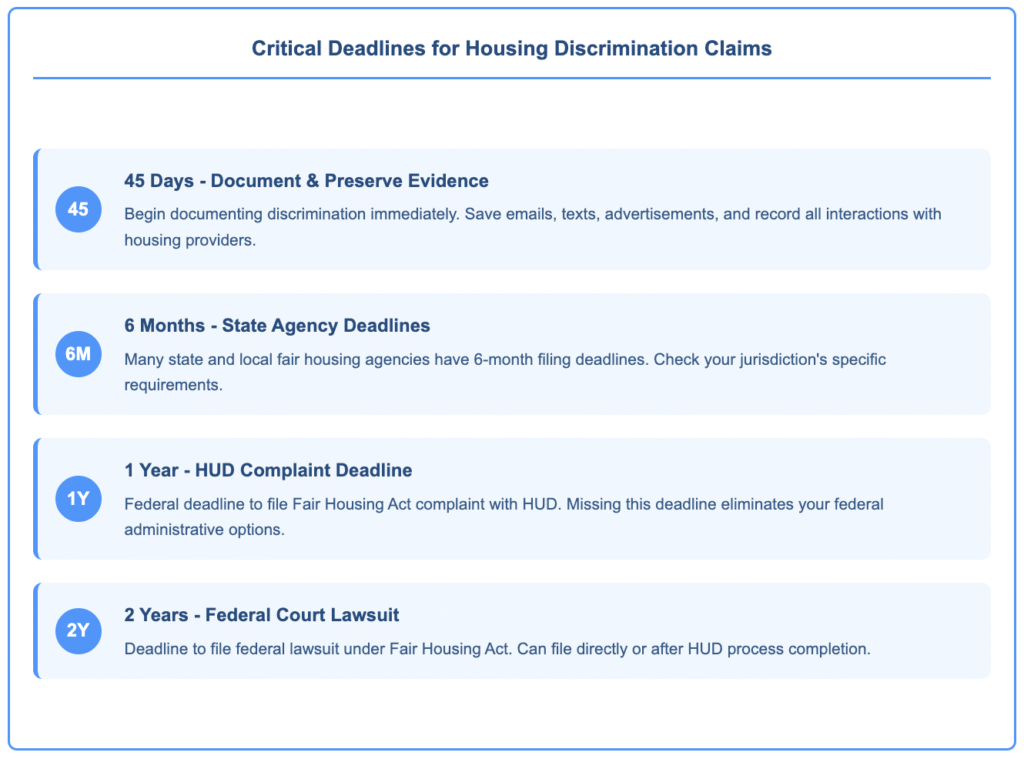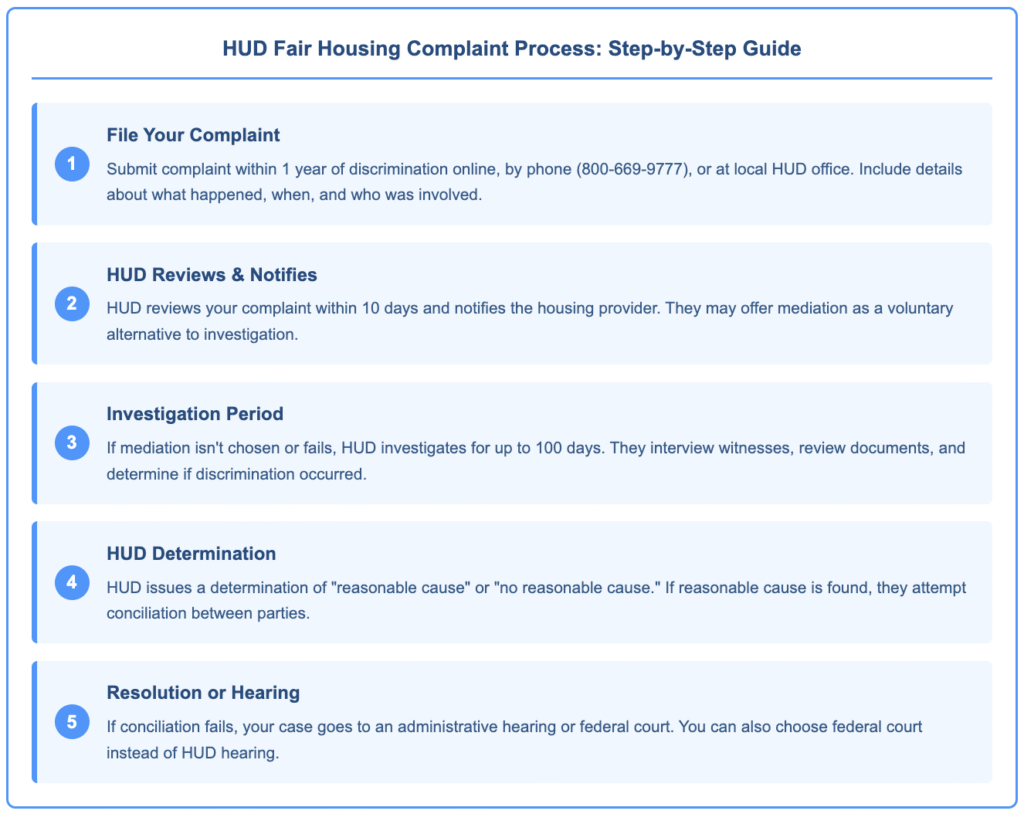Looking for an apartment with your kids in tow shouldn’t feel like navigating a minefield. Yet every day, families face subtle—and sometimes not-so-subtle—discrimination when trying to rent, buy, or finance homes simply because they have children. From landlords who suddenly have “no vacancies” when they see your family to mortgage lenders who question your financial stability after mentioning childcare costs, familial status discrimination in housing is more common than most people realize. The same biases that affect housing decisions also mean caregiving responsibilities can lead to workplace discrimination, creating compounded challenges for working parents.
At Nisar Law, we understand that finding safe, affordable housing for your family should be based on your qualifications and ability to pay—not assumptions about noise, damage, or reliability based on your family structure. These housing challenges are part of broader familial status discrimination protections that extend to employment and other areas of life
The good news? Federal and state laws provide strong protections against housing discrimination, and knowing your rights is the first step toward securing fair treatment.
Disclaimer: This article provides general information for informational purposes only and should not be considered a substitute for legal advice. It is essential to consult with an experienced employment lawyer at our law firm to discuss the specific facts of your case and understand your legal rights and options. This information does not create an attorney-client relationship.
Understanding Familial Status Housing Discrimination
Familial status discrimination in housing occurs when landlords, sellers, lenders, or other housing providers treat you differently because you have children under 18, are pregnant, or are in the process of gaining custody of children. This protection extends beyond traditional families to include single parents, grandparents raising grandchildren, foster families, and adoptive families.
The discrimination often starts with seemingly innocent questions. “How many kids do you have?” “Are they well-behaved?” “Will you be having more children?” These inquiries might seem like casual conversation, but they often signal that housing decisions will be based on family status rather than legitimate housing criteria.
What the Fair Housing Act Protects
The federal Fair Housing Act makes it illegal to discriminate in housing based on familial status, among other protected characteristics. This isn’t just about refusing to rent to families—it covers the entire housing process from advertising through tenancy.

Core Protections Under Federal Law
The Fair Housing Act prohibits discrimination in all aspects of housing, including rental, sales, financing, and insurance. For families, this means housing providers cannot make decisions based on your family structure or the presence of children in your household.
Advertising and Marketing Restrictions Housing advertisements cannot indicate preferences for or against families with children. Phrases like “adults only,” “no children,” or “perfect for singles” violate federal law unless the property qualifies for specific exemptions.
Application and Screening Protections Landlords and sellers cannot ask about pregnancy, family planning, or children during the application process. They cannot require higher deposits, additional fees, or different lease terms because you have children.
Terms and Conditions Equality Once housed, you cannot face different rules, policies, or treatment because of your family status. This includes everything from lease renewal terms to maintenance response times.
Common Forms of Housing Discrimination Against Families
Recognizing discrimination early helps you address it before it escalates and strengthens your position if you need to file a complaint or lawsuit.
Rental Discrimination Red Flags
Application Stage Discrimination Being told an advertised unit is suddenly unavailable when you arrive with children, while the same unit remains advertised online. Facing different application requirements, such as additional references or higher income thresholds not applied to applicants without children.
Lease Terms and Policies Being offered different lease terms, such as shorter lease periods or higher security deposits. Facing restrictions on areas of the property you can use, like pools, playgrounds, or common areas, supposedly for “safety” reasons.
Maintenance and Services Experiencing slower response times for maintenance requests or receiving different quality of service compared to tenants without children. Being blamed for normal wear and tear that would be accepted from tenants without children.
Home Purchase Discrimination
Real Estate Agent Steering Agents who direct families only to certain neighborhoods, schools, or housing types based on assumptions about what’s “appropriate” for families. Being discouraged from viewing homes because they’re supposedly “not suitable for children.”
Seller Bias Sellers who refuse to negotiate or consider offers from families, particularly in competitive markets. Being asked inappropriate questions about supervision, childcare arrangements, or family planning during home showings.
Lending and Insurance Discrimination
Mortgage Application Issues Lenders who question the stability of your income because of childcare costs or career interruptions related to family responsibilities. Being asked about future family planning that could affect your ability to pay. These intrusive questions about family planning violate the same principles that provide legal safeguards for pregnant employees and new parents in the workplace.
Insurance Challenges Insurance companies that charge higher premiums or refuse coverage based on the presence of children in the home. Being required to carry additional liability coverage not required from households without children.
Legal Framework: Federal and State Protections
Understanding the legal landscape helps you recognize violations and know which remedies are available when discrimination occurs.
Fair Housing Act Coverage and Exemptions
The Fair Housing Act covers most housing, but some important exemptions exist that you should understand.
Covered Housing Types Most rental properties, regardless of size. All homes for sale. Most lending and insurance transactions. Mobile home parks and most assisted living facilities.
Limited Exemptions Small owner-occupied buildings with four or fewer units may be exempt from some Fair Housing Act provisions. Single-family homes sold or rented by individual owners without real estate agents may have limited exemptions, but only under very specific circumstances.
Housing for Older Persons Exception Some communities can legally restrict residents by age if they qualify as “housing for older persons.” These communities must meet specific criteria, including that 80% of units are occupied by at least one person over 55, or that they’re specifically designed for seniors.
State and Local Enhanced Protections
Many states and localities provide stronger protections than federal law, covering situations the Fair Housing Act doesn’t address. Just as federal and state regulations prohibit familial status bias in employment and housing, these overlapping protections strengthen your rights across multiple areas.
Broader Coverage States Some states extend familial status protections to smaller properties exempted under federal law. Others provide additional remedies or longer deadlines for filing complaints.
Source of Income Protections Increasingly, states and cities prohibit discrimination based on the source of lawful income, including housing vouchers, child support, or government assistance that families rely on.
Building Your Discrimination Case: Documentation Strategies
If you’re experiencing housing discrimination, taking the right steps early can make the difference between a strong case and a missed opportunity for justice.
Essential Documentation Practices
Save All Communications Keep emails, text messages, voicemails, and written correspondence with landlords, agents, lenders, or sellers. Screenshot online listings that change after you inquire about properties.
Document Differential Treatment Record instances where you’re treated differently from applicants or tenants without children. Note if policies or requirements suddenly appear that weren’t mentioned to other prospective residents.
Preserve Evidence of Advertising Violations Screenshot discriminatory advertisements before they’re removed or changed. Save marketing materials that indicate family-based preferences or restrictions.

Testing and Comparison Evidence
Legitimate Housing Testing In some cases, having someone without children inquire about the same property can reveal discriminatory practices. This should be done carefully and with understanding of local laws about testing.
Timing Documentation Keep records of when you were told properties were unavailable, then monitor whether they remain on the market or are shown to others. Document how long it takes to receive responses to your inquiries compared to others.
Real-World Scenarios: How Discrimination Happens
Understanding common discrimination patterns helps you recognize problems early and respond effectively.
Scenario 1: The Vanishing Vacancy
The Situation: Maria calls about an advertised two-bedroom apartment and is told it’s available for immediate showing. When she arrives with her two young children, the landlord claims the unit was just rented and suggests she look elsewhere because “this building isn’t really set up for kids.” Single parents like Maria often face the unique challenges facing single parents in both housing and employment contexts, requiring vigilance across multiple areas.
Legal Analysis: This classic “unavailable” excuse often signals discrimination. If the unit remains advertised or is shown to applicants without children, it’s strong evidence of familial status discrimination under the Fair Housing Act. These housing decisions based on harmful assumptions about parents mirror the same stereotyping that affects employment opportunities for working families.
Your Options: Document the interaction, monitor whether the unit remains available, consider testing with applicants without children, file complaints with HUD and state/local agencies.
Scenario 2: The Conditional Approval
The Situation: John and his teenage daughter apply for an apartment. They’re approved but told they must sign additional rules about “noise control” and pay an extra $200 monthly fee for “additional wear and tear” not mentioned in the original listing or required from other tenants.
Legal Analysis: Different terms, conditions, or fees based on familial status violate the Fair Housing Act. The additional requirements suggest the landlord is making assumptions about families that constitute discrimination.
Your Options: Compare lease terms with other tenants, request written justification for additional fees, document that other tenants don’t face similar requirements, consider refusing discriminatory terms and filing complaints.
Scenario 3: The Mortgage Maze
The Situation: Sarah is pre-approved for a mortgage until she mentions she’s pregnant during the application process. Suddenly, the lender requests additional documentation about job stability and questions whether she’ll return to work after the baby is born.
Legal Analysis: Pregnancy is explicitly protected under familial status provisions. Lenders cannot make decisions based on assumptions about employment after childbirth or request different documentation because of pregnancy.
Your Options: Document the changed requirements after disclosing pregnancy, request written explanation for additional documentation, compare your treatment to other applicants, file complaints with appropriate agencies.
Filing Complaints and Seeking Remedies
When discrimination occurs, several avenues exist for seeking justice and compensation for the harm you’ve experienced.

HUD Complaint Process
The U.S. Department of Housing and Urban Development (HUD) investigates Fair Housing Act violations and provides free services to discrimination victims.
Filing Requirements and Timeline You must file within one year of the discriminatory act. Complaints can be filed online, by phone, or in person at local HUD offices. No attorney is required, though legal representation can be helpful.
Investigation Process HUD notifies the housing provider of your complaint and begins investigating. They may attempt mediation between you and the respondent. If mediation fails, HUD continues investigating and may find reasonable cause to believe discrimination occurred.
Potential Outcomes If HUD finds discrimination, they may negotiate a settlement or file charges. You can also elect to have your case heard in federal court instead of HUD’s administrative process.
State and Local Agency Options
Many states and localities have their own fair housing agencies that may offer advantages over federal complaints.
Enhanced Remedies State agencies may have authority to award different or additional remedies than HUD. Some provide faster processing or more extensive investigation resources.
Dual Filing Benefits You can often file with both HUD and state/local agencies simultaneously. This preserves all your options and may lead to faster resolution.
Private Lawsuit Options
You can file a federal lawsuit under the Fair Housing Act without going through HUD, or after HUD completes its process.
Timing Considerations You have two years from the discriminatory act to file a federal lawsuit. This timeline is separate from HUD’s one-year deadline.
Potential Damages Federal lawsuits can result in actual damages (out-of-pocket costs), emotional distress compensation, and punitive damages. Courts can also order injunctive relief requiring changes in discriminatory practices.

Remedies and Compensation for Housing Discrimination
Understanding potential remedies helps you evaluate settlement offers and decide whether to pursue legal action.
Financial Compensation
Actual Damages Recovery of out-of-pocket expenses caused by discrimination, including additional housing costs, application fees, moving expenses, and time lost from work searching for housing.
Emotional Distress Damages Compensation for the stress, humiliation, and emotional harm caused by discriminatory treatment. These damages recognize that housing discrimination affects more than just finances.
Punitive Damages Additional compensation designed to punish discriminatory conduct and deter future violations. Federal law caps punitive damages based on the housing provider’s size.
Non-Monetary Remedies
Access to Housing Courts can order housing providers to rent or sell to you if housing is still available. This remedy ensures you get the housing opportunity that was discriminatorily denied.
Policy Changes Legal settlements often require housing providers to change discriminatory policies, provide fair housing training, and implement monitoring procedures to prevent future violations.
Affirmative Marketing Housing providers may be required to actively market to families or advertise in publications that reach protected groups they previously excluded.
Preventive Strategies for House Hunting Families
While you shouldn’t have to navigate discrimination, these strategies can help protect your family and strengthen your position if discrimination occurs.
Pre-Search Preparation
Know Your Rights Research federal, state, and local fair housing laws that apply in your area. Understanding your rights helps you recognize violations early and respond appropriately.
Prepare Documentation Gather financial documents, references, and other application materials in advance. Being well-prepared counters any suggestions that families are less organized or reliable tenants.The same stereotypes that affect housing decisions also influence how work-life programs may discriminate against parents in employment settings.
Research Fair Housing Resources Identify local fair housing organizations that can provide assistance if you encounter discrimination. Many offer free testing, counseling, and complaint assistance.
During Your Housing Search
Document Everything Keep detailed records of all housing contacts, including dates, times, people spoken with, and responses received. This documentation becomes crucial evidence if discrimination occurs.
Ask Direct Questions Inquire about specific policies regarding children, use of common areas, and any restrictions that might apply to families. Getting discriminatory responses in writing strengthens potential cases.
Monitor Online Listings Check whether properties remain available after you’re told they’re unavailable. Screenshot listings that disappear and reappear, suggesting discriminatory removal.
Working with Real Estate Professionals
Choose Knowledgeable Agents Work with real estate agents who understand fair housing law and your right to equal treatment. Agents who steer families to certain areas or away from others may be engaging in discrimination.
Address Bias Directly If agents make comments about what’s “appropriate” for families or discourage you from certain neighborhoods, address this directly and consider finding different representation.
Recent Developments in Fair Housing Enforcement
Understanding current enforcement trends helps you know what resources are available and how agencies are prioritizing different types of discrimination.
HUD Enforcement Priorities
The Department of Housing and Urban Development has increased focus on algorithmic bias and online discrimination that affects families seeking housing. Recent guidance addresses how automated screening tools and online advertising can perpetuate discrimination.
HUD has also enhanced enforcement of advertising violations, particularly discriminatory language in online rental listings and social media housing posts.
Technology and Fair Housing
Online housing platforms face increased scrutiny for algorithms that may discriminate against families. Recent settlements have required platforms to modify their systems to prevent discriminatory outcomes.
Social media advertising for housing must comply with fair housing requirements, meaning platforms cannot allow advertisers to exclude families with children from seeing housing advertisements.
State Law Innovations
Several states have strengthened familial status protections beyond federal requirements. Recent legislation in various states has expanded coverage to smaller properties, added source of income protections that particularly benefit families, and increased penalties for violations.
Taking Action: Protecting Your Family's Housing Rights
If you’re experiencing housing discrimination based on your family status, taking prompt action protects your rights and may help other families facing similar treatment. Housing discrimination often intersects with family responsibilities discrimination in employment, requiring a comprehensive approach to protecting your family’s rights.
Immediate Steps You Can Take
Document the Discrimination Start keeping detailed records immediately. Don’t wait to see if the situation improves—early documentation often provides the strongest evidence of discriminatory intent.
Preserve Evidence Save discriminatory emails, texts, voicemails, and advertisements. Take screenshots of online listings that change after you inquire about properties.
Know Your Deadlines HUD complaints must be filed within one year, while federal lawsuits have a two-year deadline. Don’t let these deadlines pass while trying to resolve issues informally.
When to Seek Legal Help
Contact a fair housing attorney if you’re experiencing:
- Repeated denials of available housing after disclosing family status
- Different application requirements or lease terms because you have children
- Discriminatory advertising or marketing practices
- Retaliation for asserting your fair housing rights
- Complex situations involving multiple forms of discrimination
Working with Legal Counsel
An experienced fair housing attorney can help you evaluate your situation, understand which laws apply, and develop a strategy that protects your family’s interests while seeking appropriate remedies.
At Nisar Law, we understand that housing discrimination affects more than just where you live—it impacts your children’s schools, your commute to work, and your family’s stability and future. Our experience with comprehensive approach to familial status discrimination helps us understand how housing bias intersects with employment discrimination, creating effective strategies to protect families across multiple areas.
Your family deserves equal access to safe, affordable housing based on your qualifications and ability to pay—not stereotypes or assumptions about families with children. If you’re facing housing discrimination based on your family status, contact us for a confidential consultation to discuss your rights and options.
Don’t let discrimination determine where your family can live. You have legal protections, and we’re here to help you enforce them while securing the housing your family needs and deserves.
Related Resources
- Familial Status Discrimination: Protection for Parents and Caregivers
- Federal and State Protections for Familial Status
- “Family Responsibilities Discrimination” Claims
- Caregiver Discrimination in the Workplace
- Pregnancy and Parenthood: Employment Protections
- Stereotyping Parents in Employment Decisions
- Single Parents and Workplace Discrimination
- Work-Life Balance Policies and Discrimination
- School Choice and Equal Access to Education
- Special Education Law: IEPs and 504 Plans
- Title IX Protections in Educational Institutions
- Bullying and Harassment in Schools: Legal Remedies


